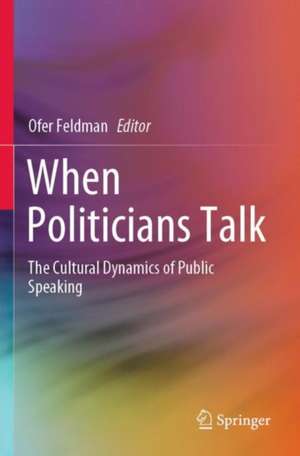When Politicians Talk: The Cultural Dynamics of Public Speaking
Editat de Ofer Feldmanen Limba Engleză Paperback – 3 sep 2022
The chapters enable comparison of the cultural effects on the different structures, styles, and contents of public speaking in societies from West to East. That is, of WHAT leaders say, HOW they say it (e.g., degree of openness, directness, usage of metaphors and slogans, xenophobic and racial expressions), under WHICH specific circumstances (e.g., National Days addresses, national or local assemblies’ debates, during election campaigns appeals, press conferences’ briefings, and in international meetings’ speeches), and for WHAT specific audiences (e.g., supporters and voters, media representatives, or the global community).
| Toate formatele și edițiile | Preț | Express |
|---|---|---|
| Paperback (1) | 684.39 lei 38-44 zile | |
| Springer Nature Singapore – 3 sep 2022 | 684.39 lei 38-44 zile | |
| Hardback (1) | 788.09 lei 6-8 săpt. | |
| Springer Nature Singapore – 2 sep 2021 | 788.09 lei 6-8 săpt. |
Preț: 684.39 lei
Preț vechi: 900.51 lei
-24% Nou
Puncte Express: 1027
Preț estimativ în valută:
130.98€ • 136.23$ • 108.13£
130.98€ • 136.23$ • 108.13£
Carte tipărită la comandă
Livrare economică 10-16 aprilie
Preluare comenzi: 021 569.72.76
Specificații
ISBN-13: 9789811635816
ISBN-10: 9811635811
Pagini: 300
Ilustrații: XII, 300 p. 1 illus.
Dimensiuni: 155 x 235 mm
Ediția:1st ed. 2021
Editura: Springer Nature Singapore
Colecția Springer
Locul publicării:Singapore, Singapore
ISBN-10: 9811635811
Pagini: 300
Ilustrații: XII, 300 p. 1 illus.
Dimensiuni: 155 x 235 mm
Ediția:1st ed. 2021
Editura: Springer Nature Singapore
Colecția Springer
Locul publicării:Singapore, Singapore
Cuprins
Introduction: Assessing Cultural Influences on Political Leaders’ Discourse.- Deep Culture: The Hebrew Bible and Israeli Political Speech.- Qur’anifying Public Political Discourse: Islamic Culture and Religious Rhetoric.- The Role of Culture in Turkish Political Discourse: President Recep Tayyip Erdoğan and the Justice and Development Party.- The Symbolic Construction of a Messiah: Jair Bolsonaro’s Public, Christian Discourse.- Rationality and Moderation: German Chancellors’ Post-War Rhetoric.- Talking Politics: The Influence of Historical and Cultural Transformations on Polish Political Rhetoric.- A Tale of Two Prime Ministers: The Influence of Greek Culture in Post-Crises Political Speech.- Rhetoric, Culture, and Climate Wars: A Discursive Analysis of Australian Political Leaders’ Responses to the Black Summer Bushfire Crisis.- The Core Socio-Cultural Building Blocks Underlying Israeli Prime Minister Benjamin Netanyahu’s Speeches to the United Nations General Assembly.- The President as Macho: Machismo, Misogyny, and the Language of Toxic Masculinity in Philippine Presidential Discourse.
Recenzii
“It is never easy to write or edit a book that aims, like Ofer Feldman’s volume, to provide a panoramic account of phenomena that fall under the rubric of political communication. … Ofer Feldman’s volume is a fine attempt to account for the interface of culture, discourse and politics … . the book possesses a broad appeal, both critical and theoretical, and is bound to attract attention from an interdisciplinary spectrum of early-career as well as experienced scholars.” (Piotr Cap, Language and Dialogue, Vol. 12 (3), 2022)
Notă biografică
Ofer Feldman is a professor of Political Psychology and Behavior at the Faculty of Policy Studies, Doshisha University, Kyoto, Japan. He is the author of more than 90 journal articles and book chapters, and more than 100 encyclopedia items, in the fields of political psychology/behavior, communication studies, and Japanese politics, and the sole author, co-author, sole editor, and co-editor of 16 books and monographs, including Talking Politics in Japan Today (2004), Seiji shinrigaku [Political Psychology] (in Japanese, 2006), The Psychology of Political Communicators (2019, with Sonja Zmerli), and The Rhetoric of Political Leadership (2020).
Textul de pe ultima copertă
This book details the relationship between culture and the language used by public figures, including politicians, political candidates, and government officials, in the broad context of political behavior and communication. Employing a variety of perspectives, theoretical, conceptual, methodological, and analytical approaches, chapters focus specifically on the question of HOW cultural factors (such as religion, history, economy, majority/minority relations, social structure, and values) shape the content, nature, and characteristics of the rhetoric that public figures utilize in selected countries in the Americas, Europe, Asia, Oceania, and the Middle East.
The chapters enable comparison of the cultural effects on the different structures, styles, and contents of public speaking in societies from West to East. That is, of WHAT leaders say, HOW they say it (e.g., degree of openness, directness, usage of metaphors and slogans, xenophobic and racial expressions), under WHICH specific circumstances (e.g., National Days addresses, national or local assemblies’ debates, during election campaigns appeals, press conferences’ briefings, and in international meetings’ speeches), and for WHAT specific audiences (e.g., supporters and voters, media representatives, or the global community).
The chapters enable comparison of the cultural effects on the different structures, styles, and contents of public speaking in societies from West to East. That is, of WHAT leaders say, HOW they say it (e.g., degree of openness, directness, usage of metaphors and slogans, xenophobic and racial expressions), under WHICH specific circumstances (e.g., National Days addresses, national or local assemblies’ debates, during election campaigns appeals, press conferences’ briefings, and in international meetings’ speeches), and for WHAT specific audiences (e.g., supporters and voters, media representatives, or the global community).
Caracteristici
Explores the multiple ways culture affects public officials’ communication style and content in diversified societies Details political leaders’ rhetoric mode in selected countries in the Americas, Europe, Asia, Oceania, and the Middle East Is relevant to students interested in innovative, conceptual, and methodological approaches to studying political communication
